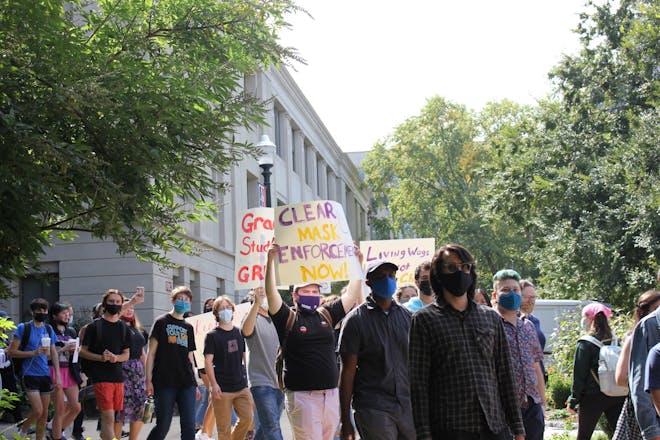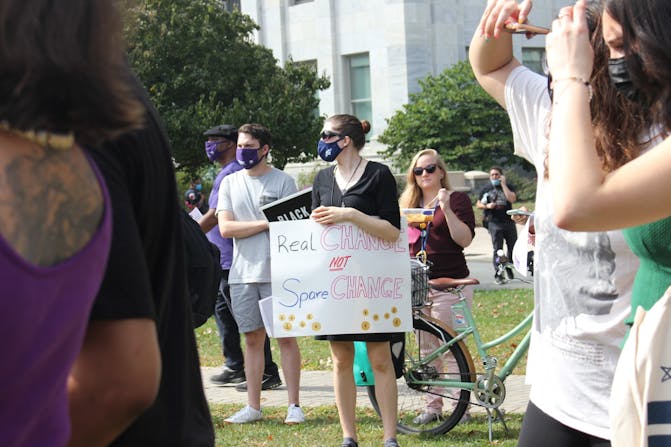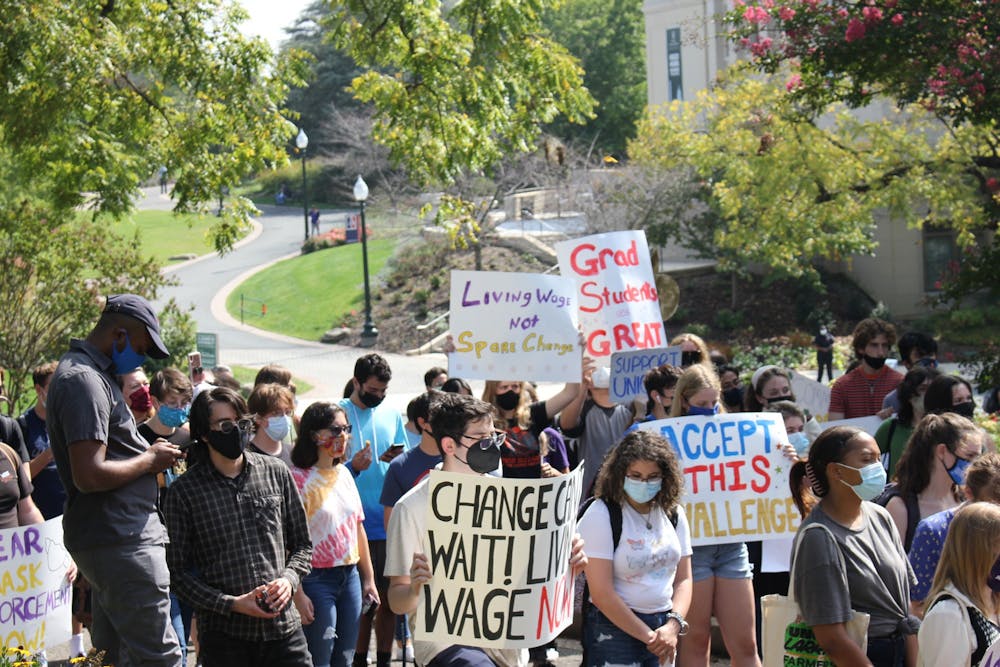American University staff protested the University’s alleged unfair wages and COVID-19 concerns on the quad on Tuesday afternoon with signs in hand. The protest was organized by the Service Employees International Union Local 500, which represents the staff, adjunct faculty and graduate students of AU.
The protesters focused on the unfair wages that workers say they are receiving at the University. Protesters chanted “change can’t wait” directly in front of President Burwell’s office on campus.
The protesters also called for greater leadership with COVID-19 safety, including asking the administration to “address inequities in campus presence requirements” and “provide adequate PPE to all community members upon request,” according to a flyer handed out at the protest.

Aubrey Hill is a full-time staff member working at the AU Career Center as a systems administrator. Hill is a former graduate student worker and an AU alumna.
“Wages at AU are flat and have been for years,” Hill said. “I talk to folks who have been here for 20 years and I talk to people who have been here for two to three years and they all experience similar situations.”
Zein El-Amine, an adjunct professor in the College of Arts and Sciences, said his experience with wages has been difficult.
“This situation is disheartening,” El-Amine said. “I work in both George Washington and American University, but I get paid less working here.”
El-Amine taught three-credit courses at both George Washington University and AU last semester. He said he was paid $2,000 more at GWU for the same work he performed at AU.
“There’s no adjunct discount,” El-Amine said, “and there’s no difference in the quality of education that we’re providing.”
Other workers expressed the same sentiment: American University is not paying them as much as other schools in the area.
Sam Sadow, a full-time staff member and adjunct professional lecturer for the art department in the CAS, said that both full-time and adjunct professors have not been treated fairly.
“I know many staff members who have been here five, 10, 12 years and still make under $40,000 a year,” Sadow said. “It’s just not a living wage even for one person without a dependent. And these are people with families.”

A flyer given out at the protest said that 20 percent of full-time workers at AU do not earn enough to support and sustain themselves. The same statistics showed that 70 percent of the University’s 102 part-time employees are currently earning less than the living wage for a single adult, even if they were to be working full-time.
Adjunct professors, according to SEIU Local 500, would not be able to support themselves alone even if they worked a full-time course load of 24 credits. The flyer said that 98 percent of adjunct faculty cannot support themselves and one child even if they were to teach a full-time course load.
University staff voted to unionize last fall, and have since been negotiating their first collective bargaining agreement with the University. Protesters charged AU with dragging its feet in the process, which can often take more than a year, data shows.
“American University continues to negotiate in good faith with the SEIU under the procedures set by the National Labor Relations Board,” said Elizabeth Deal, the University’s assistant vice president for community and internal communication, in an email to The Eagle.
”Establishing an initial collective bargaining agreement for a new unit is a thorough process requiring significant time, and that is the case for the new unit representing academic affairs staff,” Deal said.
In order to arrive at a compromise that all parties agree to, Deal said the University is carefully processing shared proposals and negotiations.
AU’s Young Democratic Socialists of America chapter is also helping worker’s unions on campus.
“We obviously want to help the union in any way possible,” said Eduarda Serafim, a senior and part of YDSAAU’s leadership board. Serafim said that it was imperative for the University to implement changes. Paolo Pergami-Peries, who is also on the leadership committee, also said that they were addressing issues concerning health and COVID-19 safety.
Deal said the University is committed to “protecting the health and safety of our community and supporting all our valued staff members.”
“The University has a long way to go,” Sadow said. “They need to treat full-time staff and adjunct professors fairly, transparently, and give them wages [they deserve].”





